If you want to streamline your sales processes or scale your business, pipeline software might be the answer. While sales pipeline software isn’t a magical robot that will do all your work for you, it will provide the structure and functionality to iron out those sticking points.
Not sure which pipeline software is right for you? Well, that’s exactly what we’ll discuss in this guide.
Read on to explore the top features to consider when picking an effective pipeline software solution, the best five sales pipeline management platforms, and why monday CRM is the fully customizable, robust product that’ll fulfill all your pipeline software needs and more.
Try monday CRMWhat is sales pipeline software?
Sales pipeline software helps businesses manage and visualize the various stages of their sales process.
For example, each stage in the sales pipeline would correspond to a stage of your sales process. As a lead moves through that process, you’d use the software application to change the deal status (or drag-and-drop a card in a Kanban board) at each stage to show how the prospect progresses through your workflow.
Aside from visualizing the deals, leads, and opportunities, sales pipeline software helps automate workflows, integrates with other tools, and provides data-driven insights. In short, pipeline software helps optimize your sales processes so you can close more deals in less time.
What benefits does a sales pipeline offer?
The overarching advantage of sales pipelines is that they enable teams to manage the sales process more effectively, which results in more robust lead management and higher close rates. But there are several more important benefits.
1. Improved visibility and organization
A sales pipeline clearly visualizes all deals and prospects at different stages of the sales process. This helps sales teams stay organized and track where each opportunity stands, ensuring no deals slip through the cracks.
2. Better forecasting and revenue projections
By tracking deals as they move through the pipeline stages, businesses can more accurately forecast expected revenue and sales performance. The pipeline data allows teams to estimate close rates and predict how many deals will likely convert in a given timeframe.
3. Standardized and optimized sales process
Implementing a sales pipeline helps standardize the sales methodology across the organization. It provides a structured framework with clear steps that salespeople should follow to move opportunities towards closure. This allows teams to identify bottlenecks and optimize the process for maximum efficiency.
4. Prioritization of high-value opportunities
A sales pipeline provides insight into the total value of deals at each stage. This enables sales teams to prioritize and focus efforts on the most promising, high-value opportunities for better resource allocation.
5. Performance tracking and coaching
Most sales pipeline software includes dashboards and reporting functionality, which provide insights into individual rep performance, deal velocities, and conversion rates at each stage. This facilitates performance management, targeted coaching, and continuous process improvements.
In essence, a well-designed and actively managed sales pipeline offers businesses better organization, forecasting capabilities, process standardization, prioritization of efforts, and performance tracking — ultimately driving higher sales productivity and revenue growth.
What are other types of business pipelines?
In addition to sales, various business functions use pipelines to visualize, manage, and optimise processes involving multiple stages or steps.
1. Marketing pipeline
A marketing pipeline tracks leads and prospects as they move through the various stages of the marketing funnel, from initial awareness to becoming sales-qualified leads. This pipeline helps marketers visualize their lead generation and nurturing efforts.
2. Project pipeline
In project management, a pipeline represents a project’s stages, from initiation to planning, execution, monitoring, and closure. Project managers use pipelines to track the status and progress of multiple projects simultaneously.
3. Product development pipeline
Companies that develop new products or services often have a product development pipeline that outlines the stages involved, such as ideation, prototyping, testing, and launch. This pipeline helps manage the product life cycle. Similarly, software development teams can create a continuous delivery pipeline to keep track of all required updates and allow each developer to work more autonomously.
4. Recruitment pipeline
Human resources departments may use a recruitment pipeline to track the different stages of the hiring process, from sourcing candidates to screening, interviewing, and onboarding new employees.
5. Customer support pipeline
For businesses that provide customer support, a pipeline can represent the various stages a support ticket or case goes through, from initial submission to resolution and follow-up.
6. Content creation pipeline
Content marketing teams may use a pipeline to manage the different stages of content creation, such as ideation, writing, editing, publishing, and promotion. Design agencies may use pipeline software to manage the inflow of new design work right through to completion.
5 best sales pipeline management software on the market
There are several options when choosing sales pipeline management software, each with its pros and cons. In this section, we’ll discuss the top five sales pipeline platforms.
1. monday CRM
Best for: Centralizing the entire sales cycle.
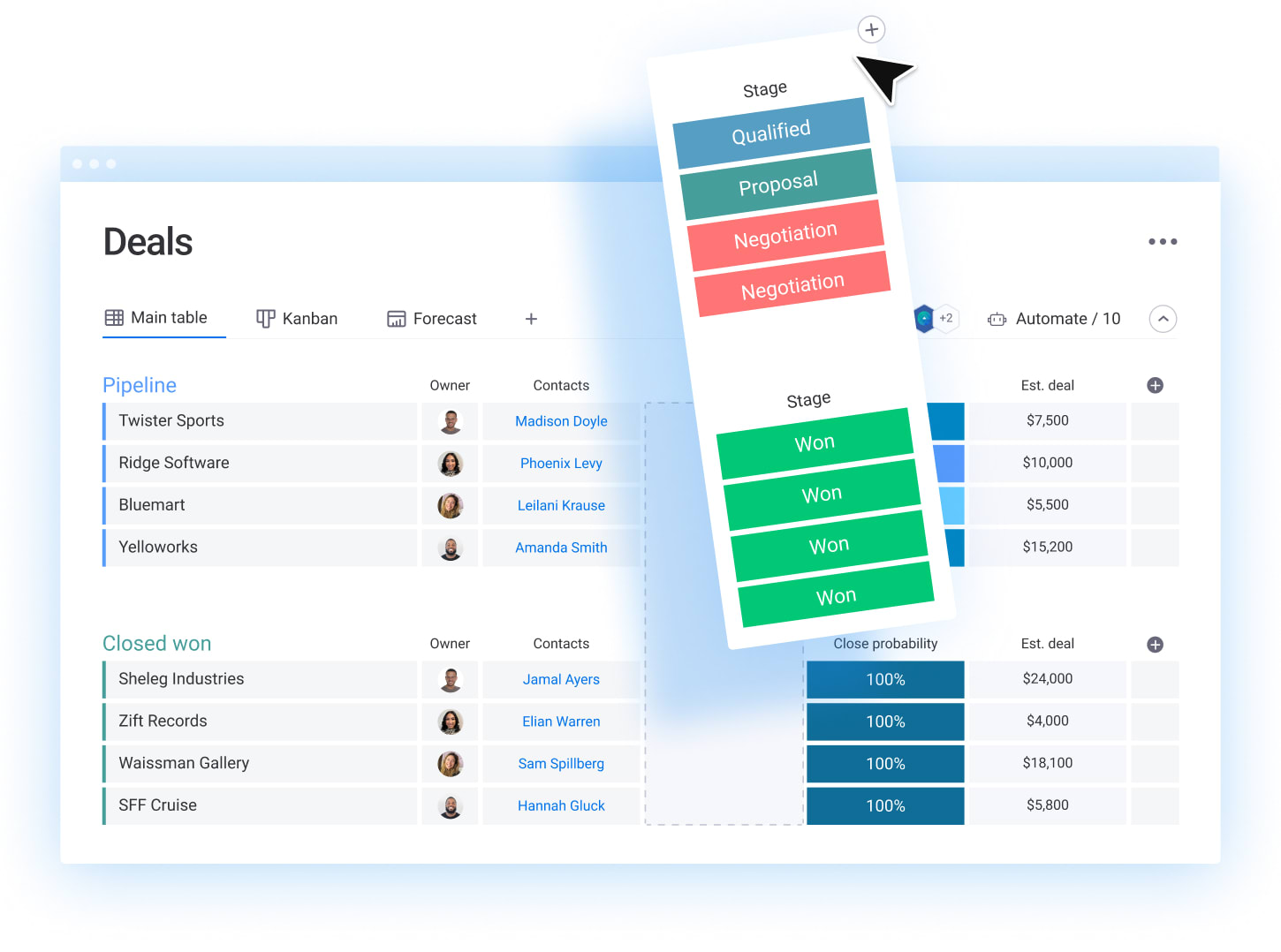
monday CRM is a fully-customizable, no-code platform that lets you centralize your entire sales cycle. You can organize and manage your pipeline, streamline customer communications, automate manual processes, and gain valuable insights into all your data in one place.
Key features of monday CRM
- Deal management: See where deals stand at a glance with a 360-degree visual pipeline and clearly understand where each opportunity stands in your pipeline.
- Automation: Save valuable time and close more deals by automatically assigning leads to agents, setting reminders for upcoming activities, and getting notified when a lead opens an email.
- Customization: Easily tailor the platform to your unique sales pipeline, workflows, and processes. Edit deal stages, add multiple columns, and manage unlimited pipelines and contacts.
- Contact management: Automatically keep track of client interactions and log sent emails in one central location. Save time with personalized email templates and AI-powered suggestions.
monday CRM pricing: $12/user/month (Basic); $17/user/month (Standard); $28/user/month (Pro); Custom (Enterprise).
Try monday CRM2. Pipedrive
Best for: Small to medium-sized businesses looking to optimize their sales operations.
Pipedrive CRM is a pipeline-focused platform designed by salespeople to optimize and streamline the sales process. It’s best known for its ease of use, customization, and comprehensive customer support.
Key features of Pipedrive
- Pipeline management: Track leads, spot opportunities, and measure critical activities by customizing pipelines (with stages and fields) to match your sales cycle.
- Workflow automation: Set up automated actions and notifications when deals reach certain pipeline stages.
- Reporting and dashboard: Get detailed reporting on sales and key activities and track progress against goals in the dashboard.
Pipedrive pricing: $14/user/month (Essential); $29/user/month (Advanced); $49/user/month (Professional); $64/user/month (Power); $99/user/month (Enterprise).
3. Zoho CRM
Best for: Small to mid-sized businesses looking for a customizable CRM.
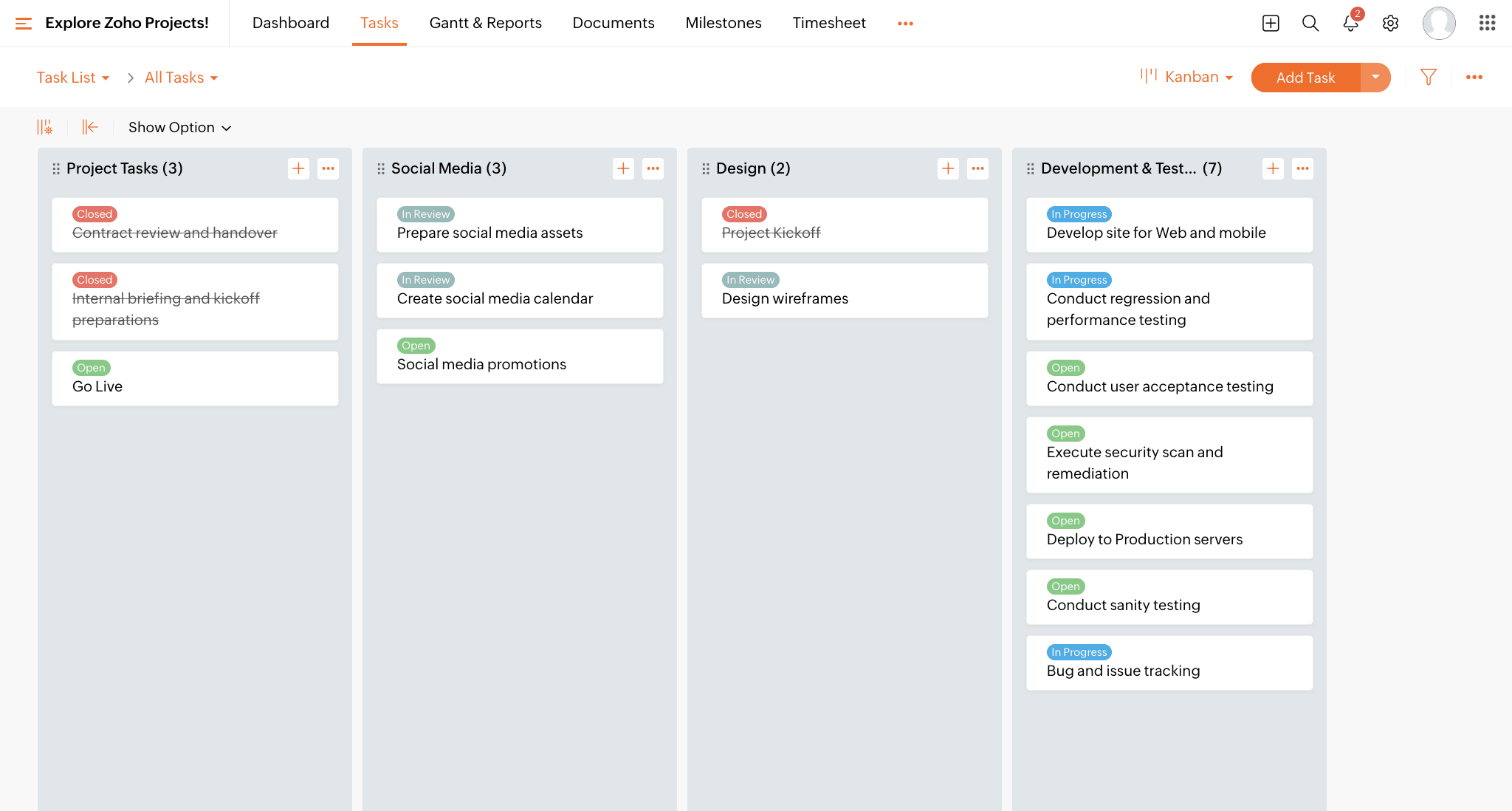
Zoho CRM helps businesses manage their sales, marketing, and customer service operations from a single platform. It’s ideal for small to mid-sized teams who want to visualize and customize distinct sales pipelines for different processes.
Key features of Zoho CRM
- Pipeline management: Manage leads, contacts, deals, and accounts through the sales pipeline. Prioritize sales teams’ efforts with lead scoring and lead assignment.
- Communication: Converse in real-time with customers and prospects from one platform via emails, live chat messages, phone conversations, and social media interactions.
- Integration: Connect third-party applications such as Google Workspace, Office 365, MailChimp, and Zendesk to provide a seamless user experience.
Zoho CRM pricing: $0 for 3 users (Free); $14/user/month (Standard); $23/user/month (Professional); $40/user/month (Enterprise); $52/user/month (Ultimate).
4. Freshsales CRM
Best for: Small to medium-sized businesses looking to streamline their sales processes.
Freshsales CRM helps sales teams streamline processes and drive growth through data-driven insights and automation. It offers sales pipeline management, AI-powered insights, automation, and a unified CRM for sales, marketing, and support teams.
Key features of Freshsales CRM
- Pipeline management: Track different product lines, marketing campaigns, or sales teams in parallel with multiple sales pipelines.
- AI-powered insights: Analyze historical sales data, activities, and engagement to gain deal insights, smart recommendations, and predictions.
- Automation: Streamline repetitive sales tasks such as lead assignment, sending emails, task creation, and field updates, enabling more efficient and scalable outreach.
Freshsales CRM pricing: $0 for 3 users (Free); $11/user/month (Growth); $47/user/month (Pro); $71/user/month (Enterprise).
5. Salesforce Sales Cloud
Best for: Businesses of all sizes, from small companies to large enterprises.
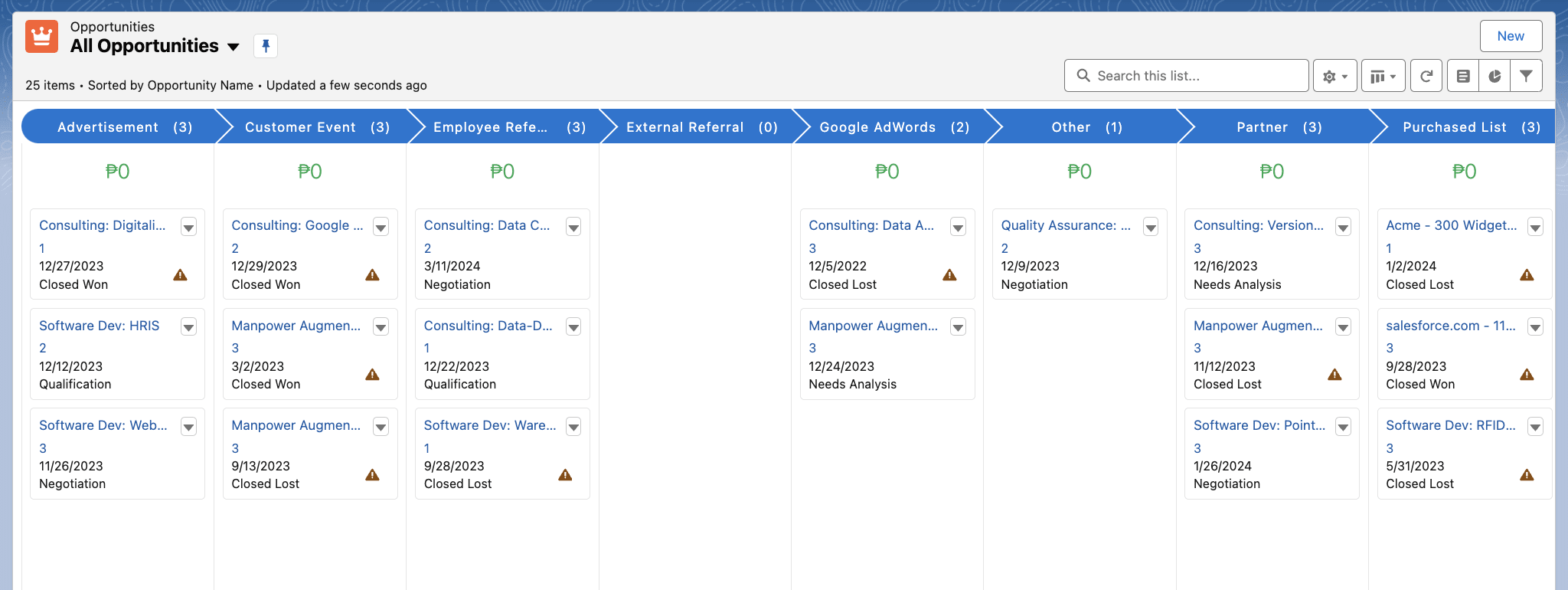
Salesforce Sales Cloud is a comprehensive CRM platform that helps businesses streamline their sales processes and drive growth. It combines all customer information in an integrated platform incorporating marketing, lead generation, sales, customer service, and business analytics.
Key features of Salesforce Sales Cloud
- Pipeline management: Customize the sales pipeline stages to match your unique sales process and requirements.
- Analytics: Get real-time visibility into sales team metrics, conversion rates, lead volumes, and sales pipeline.
- Workflow automation: Streamline repetitive sales tasks, automate actions and notifications, and progress deals through the pipeline.
Salesforce Sales Cloud pricing: $25/user/month (starter Suite); $80/user/month (Professional); $165/user/month (Enterprise); $330/user/month(Unlimited); $500/user/month (Einstein 1 Sales).
5 essential functions of sales pipeline software
Here are five essential functions to look for in your sales pipeline software to help you manage your sales processes more effectively.
1. Visualize everything in one place
As your team grows, tracking the progress of potential sales as they move through different stages of the sales process can be difficult. That’s one of the primary problems sales pipeline software aims to solve, though, since the visual interface lets you see all deals, leads, and opportunities through defined pipeline stages.
With monday CRM, for example, you can use a Funnel Chart to better understand your pipeline conversion rates between different stages in the sales funnel.
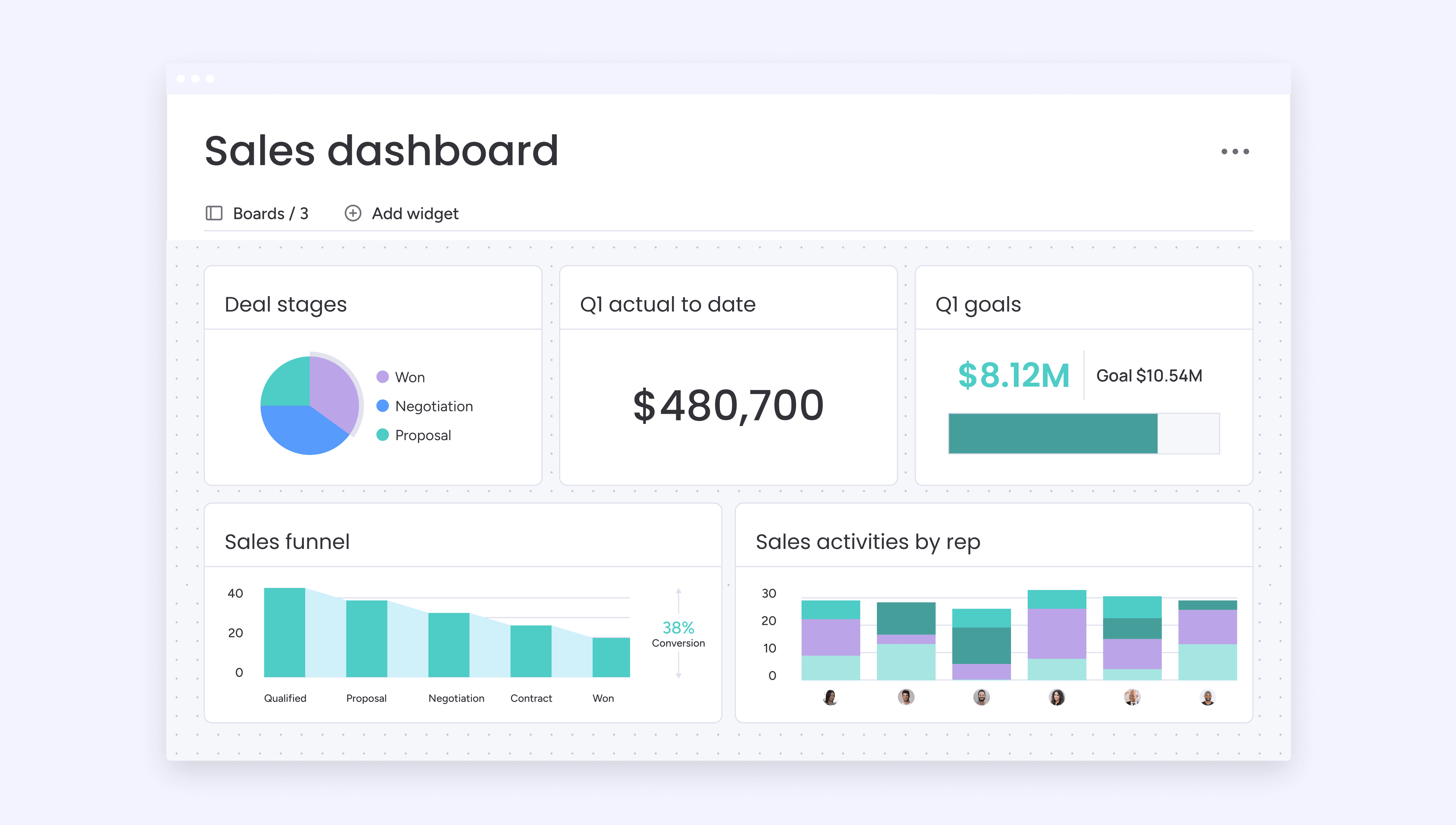
2. Automate workflows
Most teams spend a large chunk of each day on repetitive, manual tasks, which reduces productivity and makes it harder to complete essential work. With sales pipeline software, though, you can eliminate much of the time you’re spending on those manual tasks by automating repetitive tasks like sending notifications and reminders and progressing deals to the next stage.
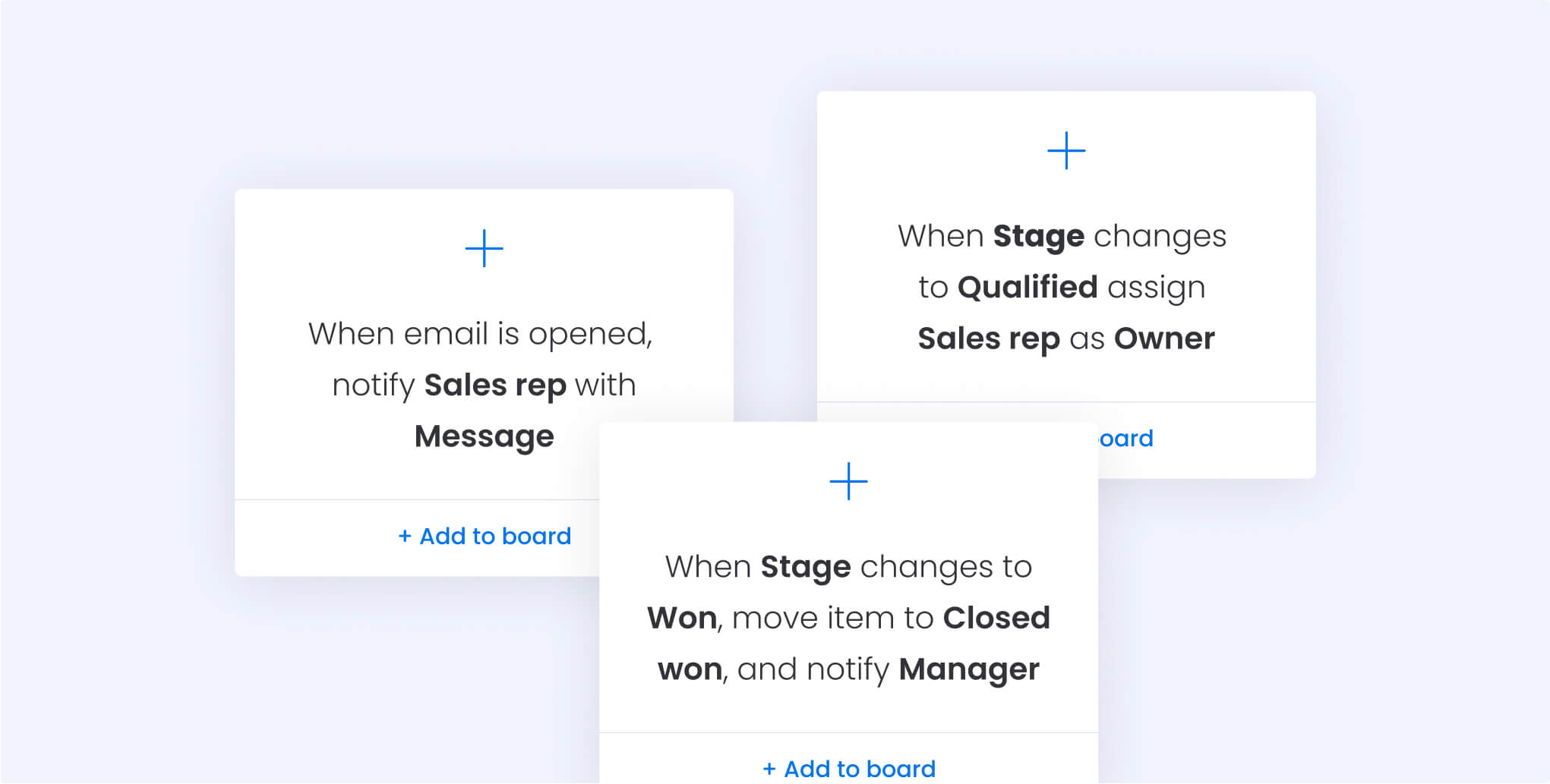
This automation helps streamline the sales process, keeps everyone on the same page, and ensures no deals fall through the cracks.
3. Track leads
A good sales pipeline management tool allows teams to visually monitor and analyze the leads their sales reps are bringing in. This data helps optimize lead allocation and identify top-performing reps.
For example, with monday CRM, you can analyze each rep’s history, determining who is bringing in the most leads and who needs to bring in more.
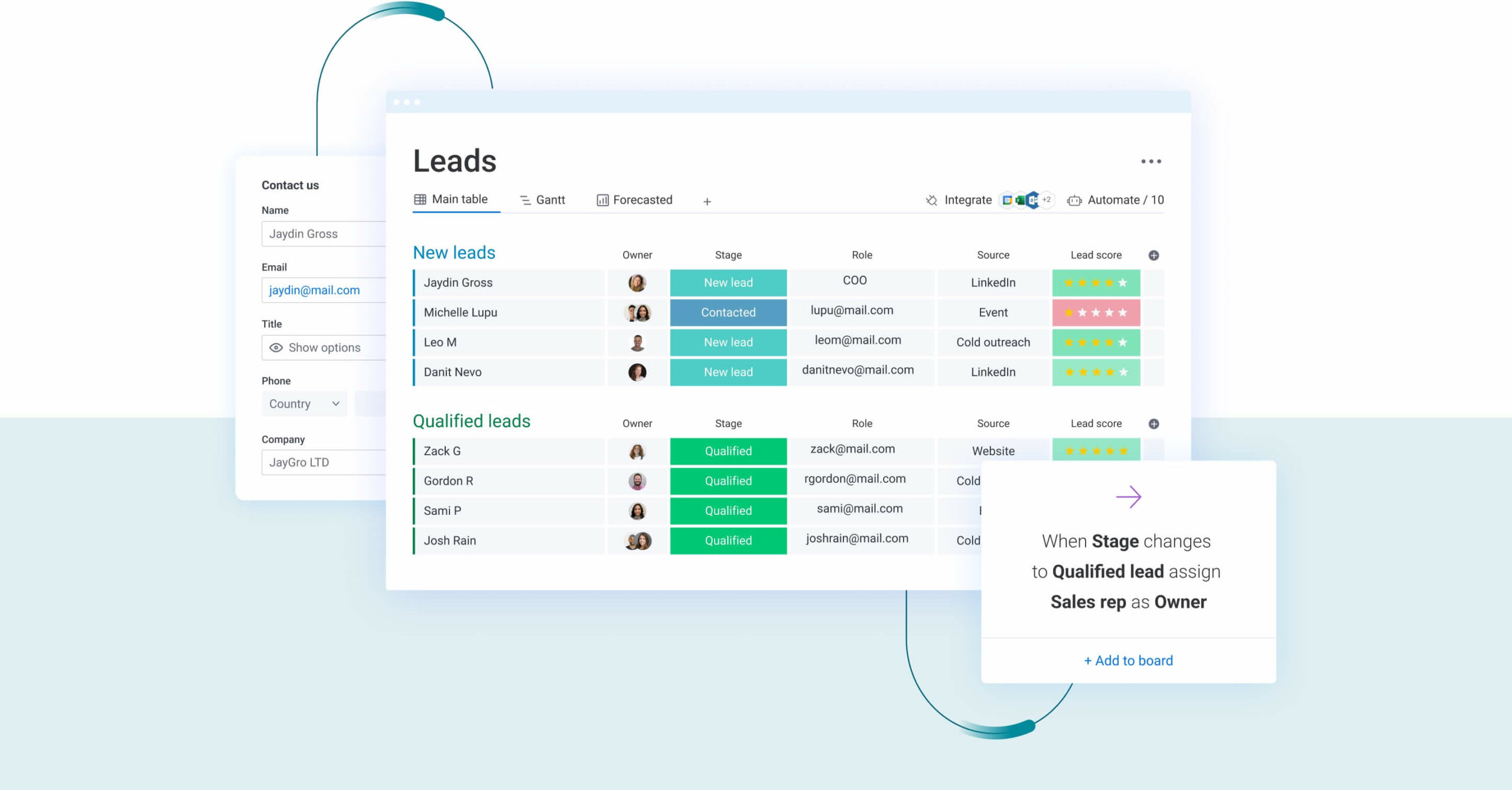
When you use good lead tracking software and analyze its data, you’ll know exactly how to allocate leads and ensure everything is handled most effectively for your team.
4. Forecast revenue
Pipeline software offers reporting and forecasting capabilities to analyze metrics like deal velocity, conversion rates, and sales performance. This allows you to forecast future revenue based on the current pipeline and deal probabilities.
With monday CRM, you can keep track of your sales projections, set the deal value and close probability, and then leverage reports to track forecast vs. actual sales by month, sales rep, or any other criteria.
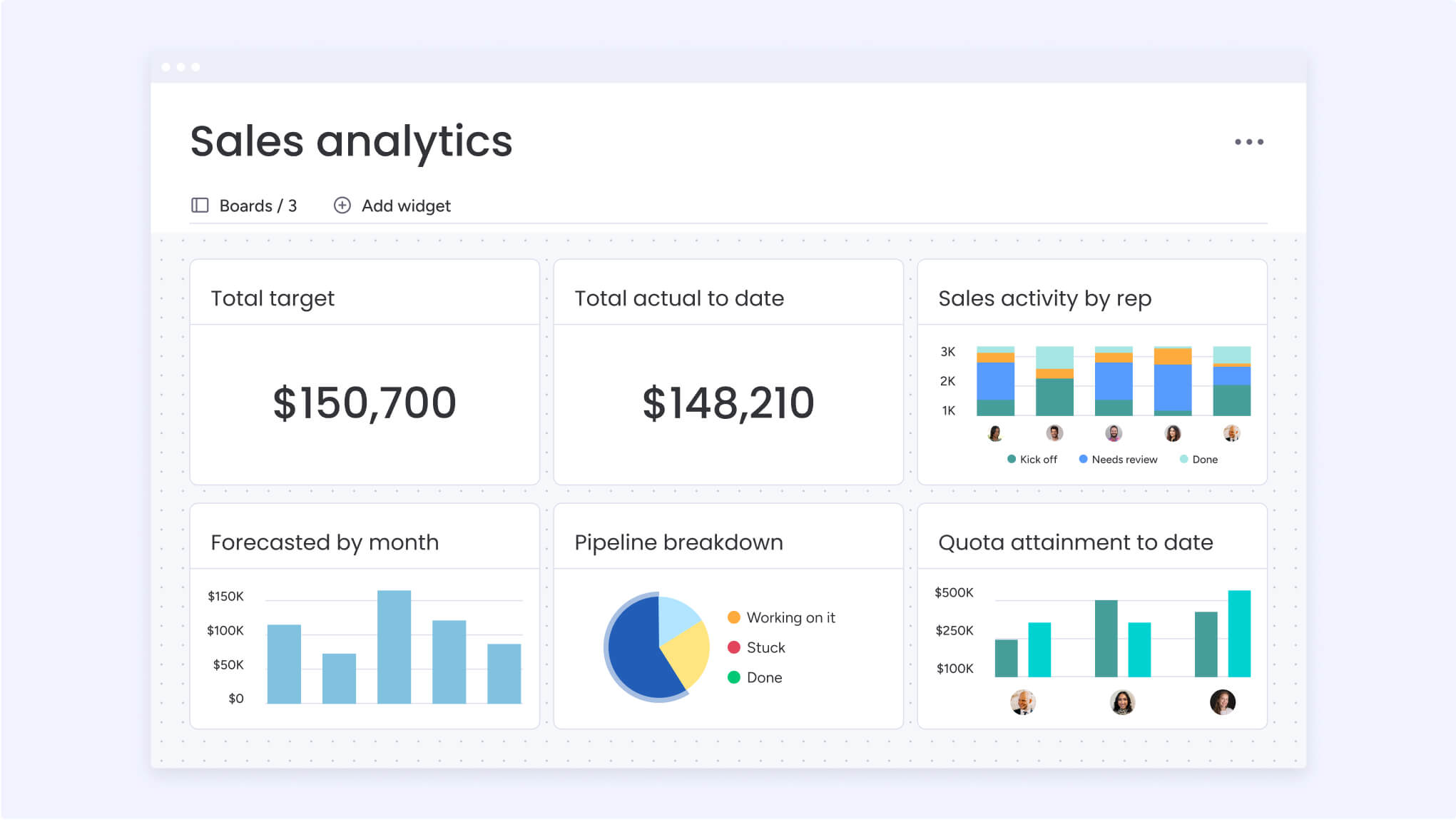
5. Customize pipeline stages
Most pipeline software solutions allow you to customize pipeline stages, fields, and workflows to align with existing sales methodologies and sales processes and match new requirements. For example, you can segment your deals into categories like “qualified,” “proposal,” “negotiation,” and “won,” which make it easy to keep track of sales activity.
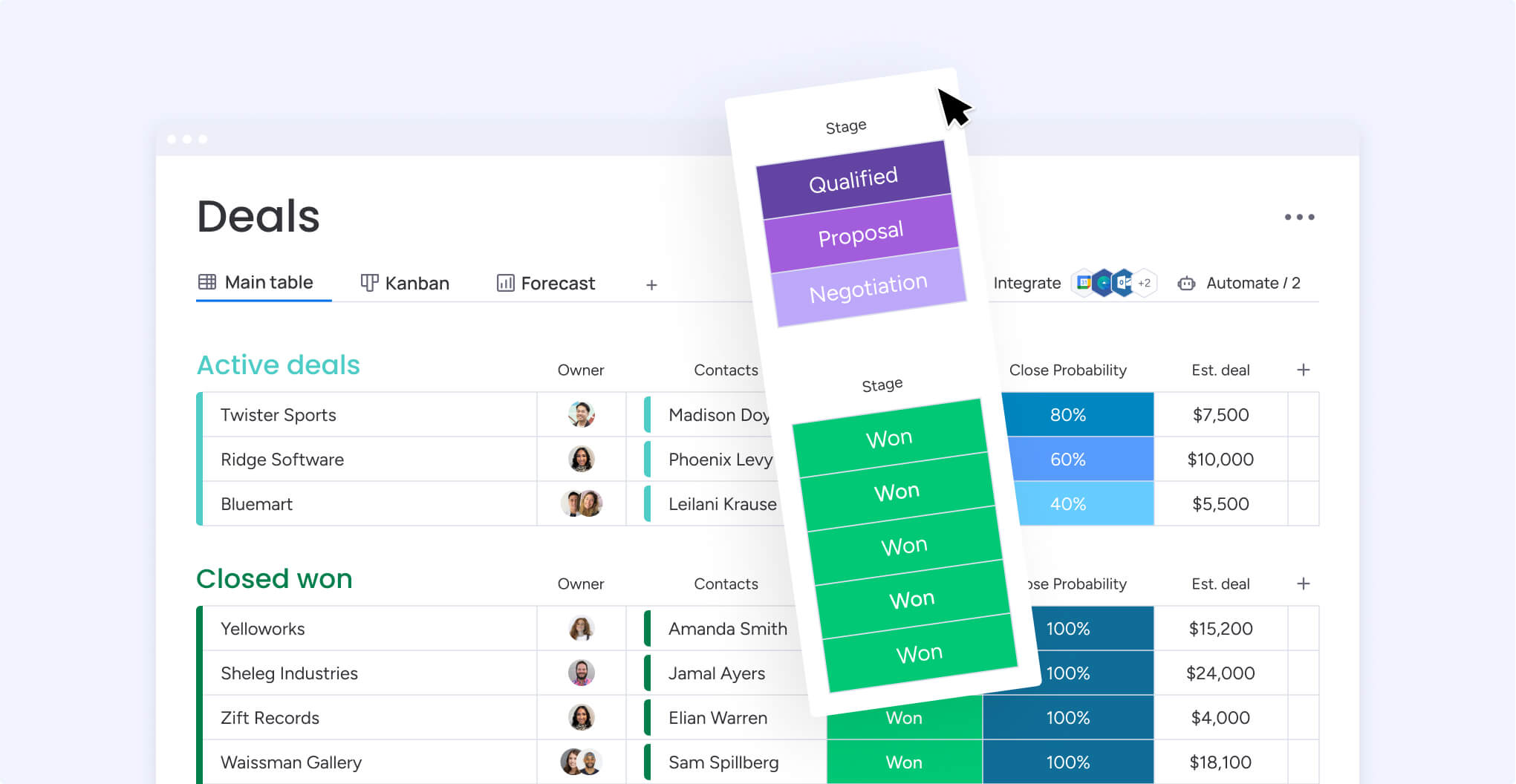
Get all the top pipeline software features and more with monday CRM
Pipeline software can deliver several benefits for sales teams, software developers, and project managers alike, as long as you choose a solution with the right features, that scales as your business grows, like monday CRM.
You can easily tailor the platform to fit your unique sales pipeline, workflows, and processes. Plus, you get immediate insights into your sales pipeline status, sales forecasting, and team performance to drive real business impact.
Still trying to figure out where to start? No problem, you can create your pipeline using our sales process template.
But no matter how you decide to use monday CRM, rest assured that you’ll have all the top features at your fingertips to manage your pipeline, optimize your sales processes, and maximize efficiency.
FAQs
What is pipeline management software?
Pipeline management software helps sales, project, and development teams better manage, visualize, and optimize their end-to-end processes through features like automation, integration, and data-driven insights.
What's the difference between a CRM and a pipeline?
A CRM is a comprehensive platform that helps businesses manage various aspects of customer relationships, including lead and contact management, sales process automation, marketing and customer service integration, and reporting and analytics. On the other hand, a pipeline refers explicitly to the sales pipeline or sales process management functionality within a CRM system that helps sales teams track the progress of sales opportunities and deals.
What are the 5 stages of a sales pipeline?
Most sales operations will progress through the following steps: (1) Prospecting or lead generation; (2) Initial contact and lead nurturing; (3) Lead qualifying; (4) Product demo or free trial; (5) Proposal or negotiation.
 Get started
Get started 

